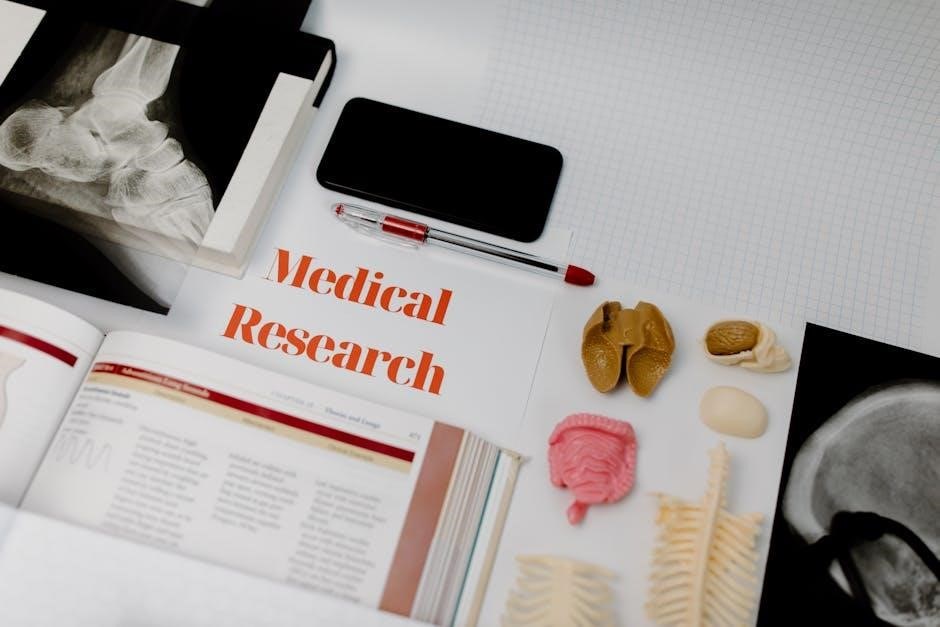Welcome to the Chemistry Final Exam Study Guide! This comprehensive resource is designed to help you prepare effectively for your exam‚ covering key topics and strategies to ensure success.
1.1. Understanding the Exam Format and Content
Familiarize yourself with the exam format‚ including question types such as multiple-choice‚ short-answer‚ and problem-solving sections. The content typically covers key areas like stoichiometry‚ thermodynamics‚ and chemical reactions. Understanding the structure and content distribution helps you allocate study time effectively and focus on high-weight topics to maximize your score.
1.2. Key Topics to Focus On
Focus on mastering stoichiometry‚ chemical reactions‚ and thermodynamics‚ as these are often heavily weighted. Additionally‚ review the periodic table‚ chemical properties‚ and kinetics. Practice problem-solving techniques and memorize key terms like endothermic and exothermic reactions. Understanding these core concepts will build a strong foundation for tackling exam questions with confidence.
Effective Study Strategies for Chemistry
Develop a structured study plan‚ incorporating active learning techniques like problem-solving and flashcard memorization. Regular practice and group study sessions can enhance understanding and retention of complex concepts.
2.1. Creating a Study Schedule
Creating a study schedule is crucial for effective exam preparation. Allocate specific time slots for each topic‚ ensuring balanced coverage of all subjects. Prioritize challenging areas and include regular breaks to maintain focus. Consistency is key—stick to your plan and review it weekly to adjust as needed. This structured approach will help you stay organized and confident.
2.2. Active Learning Techniques
Active learning involves engaging with the material through practice problems‚ flashcards‚ and group discussions. Teach concepts to others‚ as explaining reinforces understanding. Use online tools like Quizlet for interactive memorization. Regularly test yourself with past exam questions to identify weak areas. Active participation ensures deeper retention and better grasp of complex chemistry concepts‚ making study sessions more productive and effective.
Mastering Key Chemistry Concepts
Mastering key chemistry concepts is crucial for exam success. Focus on understanding the periodic table‚ stoichiometry‚ and chemical reactions. Regular practice with problems and flashcards reinforces learning‚ ensuring a strong foundation for tackling complex topics effectively.
3.1. The Periodic Table and Chemical Properties
The periodic table is a cornerstone of chemistry‚ organizing elements by atomic structure and properties. Understanding periodic trends‚ such as atomic radius and electronegativity‚ helps predict chemical behavior. Memorize key groups like alkali metals and noble gases‚ and practice identifying patterns to master chemical properties and reactions effectively for exam success.
3.2. Stoichiometry and Chemical Reactions
Mastering stoichiometry and chemical reactions is crucial for solving quantitative problems. Practice balancing equations‚ calculating moles‚ and determining limiting reagents. Focus on common reaction types‚ such as synthesis and decomposition. Regular practice with past exam questions will enhance your ability to apply these concepts effectively and confidently during the exam.

Practicing Past Exam Questions
Practicing past exam questions helps familiarize yourself with the exam format and identify weak areas. Regular practice improves problem-solving skills and boosts confidence for the final exam.
4.1. Using Old Test Questions
Utilizing old test questions is an effective study strategy. It helps students understand the exam format‚ identify commonly tested topics‚ and improve time management. Regularly practicing these questions enhances problem-solving skills and boosts confidence. Focusing on commonly missed topics ensures a well-rounded preparation. This approach is essential for achieving success in the chemistry final exam.
4.2. Focusing on Commonly Missed Topics
Identify and prioritize commonly missed topics in chemistry exams. These often include stoichiometry‚ thermodynamics‚ and chemical kinetics. Reviewing these areas thoroughly can significantly improve your performance. Use old test questions and summaries to pinpoint weak points and allocate extra study time to master them. Consistent practice and understanding are key to excelling in these challenging sections.

Utilizing Flashcards and Study Aids
Flashcards and study aids are essential tools for memorizing key chemistry terms and concepts. Use platforms like Quizlet to create digital flashcards and focus on commonly missed topics to enhance your understanding and retention of the material.
5.1. Memorizing Key Terms
Memorizing key terms is crucial for success in chemistry. Use flashcards to learn definitions and concepts‚ focusing on terms like “endothermic” and “exothermic.” Regular review helps reinforce memory and improves understanding of complex reactions and processes. Consistent practice ensures these terms become second nature‚ aiding in problem-solving and essay questions during exams.
5.2. Using Online Resources
Online resources are invaluable for chemistry exam preparation. Platforms like Quizlet offer flashcards for key terms‚ while websites like Khan Academy and Coursera provide video tutorials and practice problems. Utilize online labs and simulations to visualize concepts. Consistent use of these tools enhances understanding and reinforces learning‚ making them essential for effective exam preparation and improved performance.
The Importance of Lab Work
Lab work is crucial for understanding practical chemistry concepts and applying theoretical knowledge. It enhances problem-solving skills and familiarizes you with safety protocols‚ procedures‚ and data analysis.
6.1. Lab Safety and Procedures
Lab safety and procedures are essential for preventing accidents and ensuring effective experiments. Always wear protective gear‚ follow safety protocols‚ and handle chemicals with care. Understanding emergency procedures and proper equipment usage is vital. Familiarize yourself with lab rules and maintain a clean workspace. Adhering to these guidelines enhances your practical skills and prepares you for real-world chemistry applications.
6.2. Analyzing Lab Data
Analyzing lab data is crucial for understanding experimental results and drawing valid conclusions. Accurately record observations‚ identify trends‚ and use statistical tools to validate findings. Regularly reviewing and interpreting data enhances analytical skills‚ which are essential for success in both exams and real-world chemistry applications. This practice also reinforces theoretical concepts‚ making them easier to apply in problem-solving scenarios.

Time Management During the Exam
Allocate time wisely to each section‚ prioritizing challenging questions. Use strategies like skimming multiple-choice questions first‚ then tackling longer problems. Stay calm and focused to maximize efficiency.
7.1. Allocating Time to Each Section
Allocate specific time to each exam section to avoid running out of time. Start with multiple-choice questions‚ dedicating 1-2 minutes per question. For calculations and essays‚ allocate 5-10 minutes each. Managing time effectively ensures you attempt all questions‚ reducing stress and improving performance. Prioritize challenging sections to maintain focus and balance your effort across the entire paper.
7.2. Strategies for Multiple-Choice Questions
For multiple-choice questions‚ read each question and option carefully. Eliminate obviously incorrect answers first‚ increasing your chances of selecting the right one. If unsure‚ make an educated guess rather than leaving it blank; Use the process of elimination and manage time effectively‚ ensuring you attempt all questions. Stay calm and focus on one question at a time to maintain clarity and accuracy.

Staying Calm and Focused
Staying calm and focused is crucial for exam success. Regular breaks‚ deep breathing‚ and positive mindset help maintain concentration and reduce anxiety‚ ensuring optimal performance during the exam.
8.1. Taking Regular Breaks
Taking regular breaks is essential for maintaining mental clarity and focus. Short‚ frequent breaks help prevent burnout and allow your brain to recharge. Schedule intervals of 10-15 minutes every hour to stretch‚ hydrate‚ and relax. This practice improves retention and reduces exam anxiety‚ ensuring you stay refreshed and ready to tackle challenges effectively.
8.2. Managing Exam Anxiety
Managing exam anxiety is crucial for optimal performance. Practice deep breathing exercises‚ positive visualization‚ and mindfulness to stay calm. Stay hydrated‚ eat well‚ and ensure adequate sleep. Break tasks into manageable steps to reduce overwhelm. Remind yourself of your preparation and focus on what you can control. A well-structured study plan and consistent practice will boost confidence and help alleviate anxiety.
Reviewing and Refining Your Study Plan
Regularly review and refine your study plan to ensure it aligns with your progress; Adjust timelines and focus areas as needed to maximize efficiency and effectiveness.
9.1. Regular Revision of Notes
Consistently revise your notes to reinforce learning. Review key concepts‚ formulas‚ and reactions regularly. Organize notes into summaries or flashcards for quick reference‚ ensuring clarity and retention of information.
9.2. Continuous Practice
Engage in regular practice to build confidence and mastery. Use past exam questions to familiarize yourself with formats and common topics. Start with easier problems and gradually tackle more challenging ones. Consistent practice improves problem-solving skills‚ time management‚ and understanding of key concepts. Regularly reviewing and practicing ensures a strong foundation for exam success.

Collaborative Learning
Collaborative learning enhances understanding through group study and discussion. Sharing knowledge and clarifying doubts with peers strengthens problem-solving skills and retention. It fosters a supportive environment for success.
10.1. Joining a Study Group
Joining a study group provides structured support and diverse perspectives. Working with peers helps identify knowledge gaps and reinforces concepts. Group discussions clarify complex topics‚ while shared resources and problem-solving enhance learning efficiency. Regular meetings keep you accountable and motivated‚ ensuring steady progress toward exam readiness. Collaboration fosters confidence and reduces stress‚ making studying more effective and enjoyable.
10.2. Asking Questions
Asking questions is crucial for clarifying doubts and deepening understanding. Don’t hesitate to seek help from teachers‚ peers‚ or online forums. Addressing gaps promptly prevents confusion later. Actively engaging in discussions ensures concepts are well-grasped‚ boosting confidence and exam performance. Regularly asking questions fosters a proactive learning mindset‚ essential for mastering chemistry.
Understanding Thermodynamics
Thermodynamics is the study of energy transformations. Focus on endothermic and exothermic reactions‚ understanding their applications. Le Chatelier’s Principle is key to predicting system responses.
11.1. Endothermic and Exothermic Reactions
Endothermic reactions absorb heat‚ while exothermic reactions release it. Understanding these processes is crucial for analyzing energy changes. Focus on identifying examples and their real-world applications to grasp thermodynamic principles effectively.
11.2. Le Chatelier’s Principle
Le Chatelier’s Principle explains how a system at equilibrium responds to changes. When concentrations‚ pressure‚ or temperature are altered‚ the system shifts to counteract the change. Understanding this helps predict equilibrium shifts‚ crucial for optimizing reactions and grasping thermodynamic behavior in various conditions.
Chemical Kinetics
Chemical kinetics explores reaction rates and the factors influencing them‚ such as concentration‚ temperature‚ and catalysts. Understanding kinetics is vital for predicting reaction behavior and optimizing processes;
12.1. Reaction Rates
Reaction rates measure the speed at which reactants convert to products. Factors like concentration‚ temperature‚ and catalysts significantly influence rates. Experimental methods‚ such as monitoring absorbance or pressure changes‚ determine reaction rates. Understanding rate laws and mechanisms is crucial for predicting behavior. Graphical analysis of rate data helps identify patterns and orders of reactions‚ aiding in the development of accurate chemical models and real-world applications.
12.2. Catalysts
Catalysts are substances that accelerate chemical reactions without being consumed. They lower activation energy‚ enabling reactions to proceed faster. Catalysts are crucial in both natural processes and industrial applications. Understanding how catalysts function‚ their types‚ and their role in reaction mechanisms is essential for mastering chemical kinetics. Examples include enzymes in biological systems and transition metals in industrial processes‚ highlighting their importance in efficient chemical transformations and exam preparation.
Final Exam Tips
Do warm-up problems before the exam to get into the right mindset. Practice consistently and focus on understanding concepts rather than just memorizing. Manage your time wisely during the test‚ and stay calm to perform your best.
13.1; Reading and Warm-Up Problems
Start by reading and completing warm-up problems to refresh your memory and build confidence. Begin with easier questions to get into the rhythm‚ then tackle more challenging ones. Skim through the exam to identify straightforward sections first‚ ensuring you allocate time wisely. Use practice problems to reinforce concepts and reactions‚ helping you approach the exam with clarity and precision.
13.2. Digging Deep into Practice Problems
Dive into practice problems to strengthen your understanding and problem-solving skills. Focus on past exam questions‚ especially those commonly missed‚ to identify weak areas. Use multiple-choice books and tackle easier questions first‚ then progress to harder ones. Consistently review and practice to master concepts like endothermic and exothermic reactions‚ ensuring you’re well-prepared for the exam.
